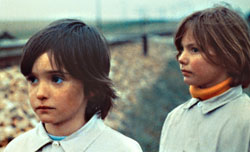YOU’VE GOT YOUR choice of kid-centric repertory titles this week, with limited engagements (and new prints) of 1948’s The Fallen Idol and 1973’s Spirit of the Beehive. The first, directed by Carol Reed and written by Graham Greene, is a middling English adultery thriller largely witnessed from the perspective of an 8-year-old boy. The second is a lovely, lyrical Spanish encounter between childhood and death, prompted by a screening of Frankenstein, circa 1940. The younger of two sisters, aged about 6, is changed forever by the movie—particularly the famous scene where the monster, charmed by a village girl, accidentally causes her drowning.
Both movies are, to an extent, about the loss of innocence. An award winner in its day, Idol doesn’t hold up nearly so well as Beehive, partly because simpering blond Bobby Henrey basically gets to keep his innocence in a tale altered substantially from Greene’s original short story “The Basement Room.” There, the boy accidentally betrays his idol, who actually is guilty of murder. In the Greene-Reed screenplay, embassy butler Ralph Richardson only appears to have fatally shoved his shrewish wife (Sonia Dresdel, a witch in need of her own Oz to terrify). The annoying boy wrongly suspects him, and the ending is a tidy trifle. The whole affair is like a crumpled draft in Hitchcock’s wastepaper basket: too cute and constructed, not enough malice or tension.
Victor Erice’s gorgeous classic Beehive, by contrast, is as hushed and grave as a child’s gaze. Morbidly curious little Ana Torrent has the kind of big, dark eyes that radiate seriousness. For her, life’s overwhelming strangeness and mystery can’t be separated from death. Her sister tells her the Frankenstein monster survives, incorporeal, around their crumbling estate in the Castilian provinces. Credulous Ana—also her character’s name—goes solemnly looking down wells, in empty barns, in the forest studded with poisonous mushrooms, everywhere between the vast sky and furrowed fields. Fantasy and reality mean about the same to her, until the shock of actual blood.
Significantly, Ana’s aloof parents spend very little time with the girls. Like the boy in Idol (whose mother and father are gone that fateful weekend), she’s making sense of the world with little (or unreliable) adult guidance. Idol errs toward clarity and dramatic resolution; Beehive makes art of mortal confusion.








